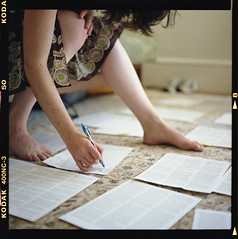For the last year, I’ve been in my first-ever in-person critique group. Julie Coulter Bellon, Emily Gray Clawson and I started off with a fairly typical arrangement for critique groups: meeting a couple times of month, exchange one or two short chapters for each meeting, read and critique those chapters for one another in advance, then read them aloud and share notes at the meeting.
 Until two of the three of us didn’t really *have* a next chapter. I’d just been reading about Kristen Lamb’s concept critique, which dovetailed really well with something I’ve long worried about with the traditional critique group format.
Until two of the three of us didn’t really *have* a next chapter. I’d just been reading about Kristen Lamb’s concept critique, which dovetailed really well with something I’ve long worried about with the traditional critique group format.
You see, if you meet twice a month and do one or two chapters at each meeting, it will take at the bare minimum six months to read an entire manuscript—if your book isn’t overly long and you’re going as fast as the critique group can accommodate you. If you only do one chapter at each of your bimonthly meetings, it could take you over a year to get through a single novel.
My impatience to get working on the next draft notwithstanding, it’s very difficult to critique a novel as a cohesive whole in this method. After more than a year, do you remember the opening chapters very well? How can you be sure the author has fulfilled the promise of the opening and the premise s/he began with? How can we judge the pacing when we read without any pace? How can we make sure the character arcs and story structure are working? How easy is it to to follow an author down a tangent rabbit hole reading a novel one chapter every fortnight?
While I do like having line edits from my critique partners, I’m unconvinced that’s the best use of all of our time. After all, a beautifully written story can still be fatally flawed and ultimately fall flat for readers—and traditional critique groups may be powerless to prevent that.
So sitting in our fourth or so meeting, facing the possibility that our brand new group might fizzle and die for lack of material (seriously?!), I ventured a radical idea.
Radically rethinking the critique group
 One of us had a manuscript completed and ready to go. So, I said, what if we worked only on her book? She’d submit many more chapters for our next meeting—we ended up doing about a quarter of the book at a time. Within two months, we’d finished her entire novel, and then the next person was ready.
One of us had a manuscript completed and ready to go. So, I said, what if we worked only on her book? She’d submit many more chapters for our next meeting—we ended up doing about a quarter of the book at a time. Within two months, we’d finished her entire novel, and then the next person was ready.
But it wasn’t just the time factor. We were so much better able to comment on how the characters grew and changed, how well the climax fit the story, how the pacing and structure worked, and more. And we still got the line edits in (virtually all the time).
Naturally, this method won’t work for every writer, reader or group. Our group is small enough that we can easily get a couple novels in each year.
And now for something slightly different
We’ve been working that way since last March, but last night we decided to Julie suggested we change things up a little. Normally we’d still tried to read all our chapters aloud. But when those chapters amounted to practically a novella in and of themselves, our meetings ran into the wee hours of the morning (with an hour commute afterwards!).
We first tried our newer method in december out of necessity. Our socializing was taking up more and more of our meeting time—no complaints!—we had a whole bunch of chapters to finish, and . . . I pretty much totally screwed up the characterization and motivation through the whole section.
So rather than reading the chapters, we focused on the notes—not the line edits, which we’d all carefully noted, but the bigger issues plaguing those pages. It was the best, most helpful critique group session I’ve ever had. (And also the worst, but that was because my pages were apparently the weakest I’ve ever shown anyone.)
So last night, we took the same tack, focusing on our big-picture notes: the exact things that would be so much harder to do if we’d only tackled a chapter at a time.
Yes, there are advantages to reading your work aloud (and disadvantages), and having someone else read it for us, but we can still read aloud at home. In fact, ideally, I do that before I even send the chapters out. Really helps to catch long sentences.
I really love our critique system. It’s different, but it really works for us. Just see what Julie and Emily have to say about it!
What do you think? How does your critique group work? Have you ever tried an “unusual” critique group format? Come join the conversation!
Photo credits: I think I do… [Do you need to edit your friends?]—eltpics; Editor’s note—juicyrai














